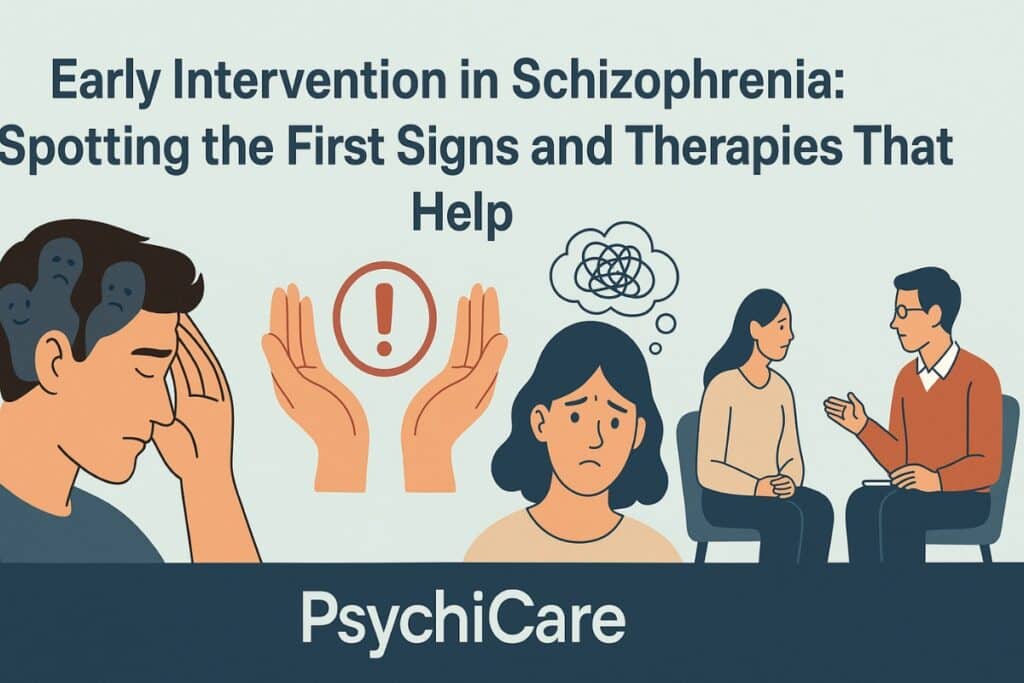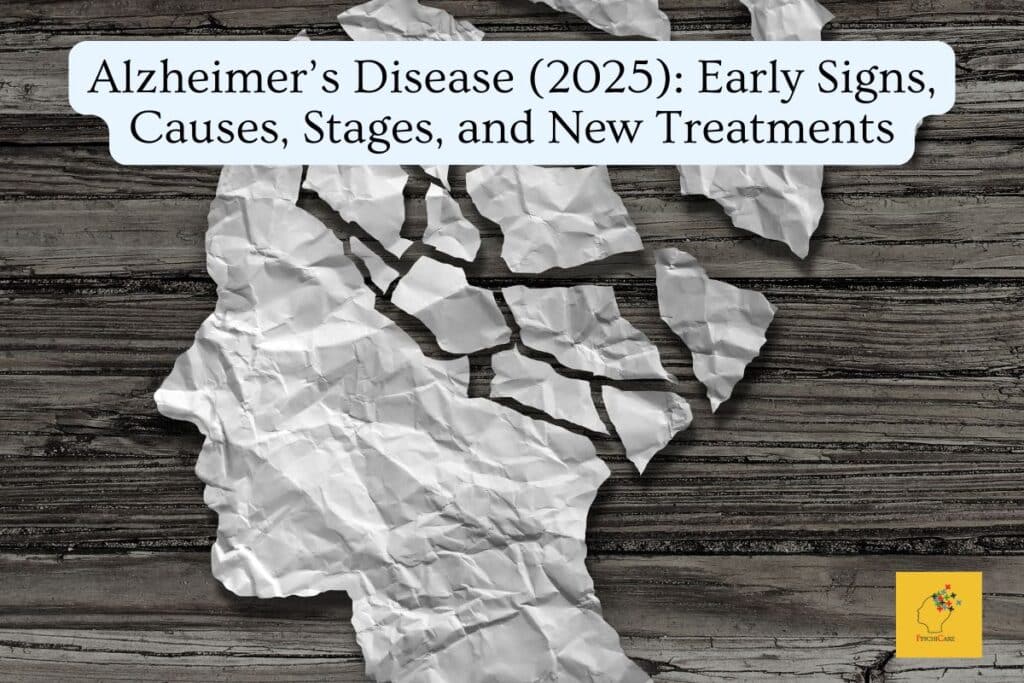Caring for someone with dementia is both an act of love and emotional endurance. As memory fades and communication changes, families often find themselves searching for ways to stay connected and supported.
That’s where online therapy for dementia comes in.
Through video sessions, cognitive tools, and guided emotional support, therapy can now reach individuals and caregivers where they are at home, in comfort, and with professional care that fits real-life routines.
These sessions don’t replace medical treatment.
They complement it, helping with emotional balance, mental engagement, and relationship stability.
At PsychiCare, we’ve seen how digital care transforms the dementia journey. Families reconnect. Caregivers feel less alone. And patients regain moments of calm and clarity through structured, compassionate support.
Online therapy is not just about convenience; it’s about connection, continuity, and comfort for those living with dementia and conditions like Alzheimer’s.
Why Dementia Care Isn’t Just Medical, It’s Emotional Too
Dementia doesn’t just affect memory; it changes the rhythm of everyday life. Families often see their loved ones withdraw, repeat questions, or struggle with once-simple routines. For caregivers, the emotional toll can feel heavier than the physical one.
That’s why therapy matters. While medication may manage symptoms, emotional and cognitive therapy helps people living with dementia stay engaged, calm, and connected to their surroundings. It also gives caregivers the understanding and tools they need to cope, turning frustration into empathy and confusion into communication.
At its core, therapy offers something irreplaceable:
- A safe emotional space for patients who feel lost or misunderstood
- Guided support for caregivers learning to respond with patience instead of panic
- Mental exercises that keep the brain active and encourage small yet meaningful progress
At PsychiCare, we believe dementia care is as much about emotional healing as it is about clinical management. Each therapy session is a step toward preserving dignity, routine, and human connection, the things that truly matter.
What Is Online Therapy for Dementia?

Online therapy for dementia, often known as telehealth for dementia care, uses digital platforms to bring emotional, behavioural, and cognitive support directly to patients and caregivers, no matter where they live.
Instead of travelling to a clinic, individuals can join therapy sessions through secure video calls, mobile apps, or structured online programs. This approach is particularly valuable for seniors who face mobility issues, families living in different cities, or caregivers balancing work and care responsibilities.
A typical online therapy plan might include:
- Video sessions with a trained dementia therapist
- Cognitive activities designed to improve focus and memory
- Guided counselling to help manage mood swings, anxiety, or agitation
- Family involvement through shared online support or group discussions
The goal isn’t just treatment, it’s connection. Through regular sessions, patients feel more stimulated and supported, while caregivers gain emotional resilience and practical tools to manage daily challenges.
At PsychiCare, our therapists design online therapy plans tailored to each family’s rhythm. Whether it’s teaching communication techniques or introducing relaxation exercises, every virtual interaction becomes a bridge, not just between therapist and patient, but between families and their shared sense of hope.
Benefits of Online Therapy for Dementia Patients and Families
The benefits of online therapy for dementia patients extend far beyond convenience. For many families, it’s the emotional anchor that keeps communication, patience, and care routines steady, even on the hardest days.
For Patients
Online therapy helps people with dementia stay mentally and emotionally active, which can reduce frustration and confusion. Sessions are structured yet gentle, providing comfort while maintaining engagement.
Key benefits include:
- Mental stimulation: Guided exercises, games, and discussions help preserve memory and focus.
- Emotional calm: Familiar voices and consistent sessions ease anxiety and agitation.
- Routine and reassurance: Regular contact gives patients a sense of structure and safety.
- Social connection: Virtual interactions prevent isolation and loneliness.
By blending technology with compassion, therapy helps patients feel seen, not just treated.
For Caregivers
Caring for someone with dementia can feel overwhelming. Online therapy creates a safe space for caregivers to share, learn, and heal, without needing to step away from their responsibilities.
Here’s how it helps:
- Flexible access to counsellors: Get professional support without travel or scheduling stress.
- Coping strategies for burnout: Learn emotional regulation and stress management techniques, vital for preventing issues like anxiety or dependence patterns often linked to chronic stress (Addiction Disorder in Adults).
- Sleep and mental health support: Therapists help improve rest cycles and manage fatigue through relaxation therapy and behavioural strategies (Sleep Disorders).
- Family-based therapy: Sessions can include multiple family members to strengthen understanding and care coordination.
Online therapy doesn’t just help the person living with dementia; it supports the entire family system, ensuring everyone involved feels guided, understood, and emotionally equipped.
Types of Online Therapy Used in Dementia Care
Different forms of online dementia therapy work together to support the brain, behaviour, and emotions. From structured memory activities to guided emotional counselling, each type of therapy offers its own way of helping both patients and caregivers feel more grounded and connected.
Cognitive Stimulation Therapy (CST)
Cognitive Stimulation Therapy online is one of the most effective interventions for dementia. It uses gentle, structured exercises, puzzles, storytelling, word association, and problem-solving to engage different parts of the brain.
Sessions often include short activities that help with:
- Memory recall and focus
- Language and conversation
- Orientation to time and place
- Group participation and social confidence
Even small improvements in attention and alertness can enhance quality of life. And when done virtually, CST becomes more accessible and consistent, especially for families managing care remotely.
Online Reminiscence Therapy
Reminiscence therapy is about connection through memory. Therapists use photos, favourite songs, or past experiences to evoke positive emotions and strengthen a sense of identity.
Online reminiscence therapy for dementia can be conducted through shared video sessions or digital albums, a powerful way for families to participate and relive meaningful moments together.
Behavioural and Emotional Counselling
As dementia progresses, it can lead to repetitive actions, frustration, or sudden emotional changes. Online behavioural therapy helps address these responses by teaching patients and caregivers how to manage triggers calmly and safely.
This approach is similar to therapies used for conditions like Obsessive-Compulsive Disorder, where structured techniques help redirect repetitive or distressing thought patterns.
Tele-Monitoring and Support Check-Ins
Virtual therapy isn’t limited to video calls. Many dementia care programs now include tele-monitoring, regular emotional and cognitive check-ins through digital platforms.
These short, guided interactions help therapists track progress, identify early signs of distress, and keep families involved in every step of care.
How Online Therapy Sessions Work

Dementia therapy online is designed to be simple, structured, and comforting for both patients and caregivers. The goal is to make therapy feel less like a medical appointment and more like a guided connection that fits naturally into daily life.
Here’s how a typical process unfolds:
1. Initial Assessment
Therapy begins with a personalised assessment.
The therapist learns about the patient’s memory patterns, behaviour, routines, and emotional triggers. This helps shape a plan that matches both medical needs and personal preferences.
2. Personalised Therapy Plan
Once assessment is complete, a tailored plan is created including a mix of cognitive activities, emotional counselling, and caregiver support sessions.
Plans often evolve as therapists observe progress and family feedback over time.
3. Live Sessions
Sessions are conducted through secure video platforms, chat, or even phone calls when needed.
They are typically short (20–45 minutes), using gentle communication and engaging exercises to sustain focus and comfort.
Patients can participate from home, surrounded by familiar faces and settings — reducing confusion and anxiety that sometimes come with in-person visits.
4. Caregiver Involvement
Caregivers are encouraged to join or observe sessions.
This helps them learn supportive responses and communication techniques to use daily. It also builds a sense of teamwork between therapist, patient, and family.
5. Privacy and Accessibility
Online therapy at PsychiCare is always delivered through secure, encrypted platforms designed with older adults in mind.
Our therapists simplify the process, guiding families through every step from logging in to setting reminders so that technology never becomes a barrier to care.
The focus is not just therapy; it’s creating comfort through familiarity and connection, even in a digital setting.
Effectiveness of Virtual Therapy for Dementia
The growing body of research from 2024–2025 continues to confirm the effectiveness of online therapy for dementia. While dementia is progressive, structured virtual interventions have been shown to slow cognitive decline, improve engagement, and ease caregiver burden.
Evidence-Based Improvements
Recent studies published in Frontiers in Psychology and MDPI Journals highlight measurable gains among participants receiving virtual cognitive stimulation and online reminiscence therapy. Patients reported:
- Greater participation in daily activities
- Enhanced short-term memory recall
- Fewer episodes of agitation or confusion
- Improved mood and sleep patterns
These outcomes mirror in-person therapy results, showing that online care can be equally beneficial especially when combined with consistent family involvement.
Impact on Caregivers
Virtual therapy doesn’t just support patients, it strengthens families.
Caregivers who engaged in online counselling or support sessions reported:
- Reduced emotional exhaustion and stress
- Higher confidence in managing behavioural changes
- Better relationship communication with the person under care
This aligns with PsychiCare’s experience, when therapy is consistent and collaborative, families become more resilient, patient, and emotionally connected.
Why It Works
Online therapy works not because it’s digital, but because it’s accessible and consistent.
Regular sessions help maintain cognitive rhythm and emotional connection, two elements that are often lost when treatment becomes sporadic or clinic-based.
The continuity of care, regardless of distance, helps patients feel secure, while caregivers stay informed and supported.
Research continues to reinforce one truth: dementia care isn’t just about treatment, it’s about maintaining connection, identity, and emotional presence and online therapy makes that possible.
Challenges in Virtual Dementia Care and How to Overcome Them
While virtual dementia care opens doors to accessibility and comfort, it’s not without its challenges. Many families worry about how older adults will adapt to screens, or whether online therapy can truly engage someone with memory or attention difficulties. The good news is that most of these barriers can be eased with thoughtful guidance and structure.
1. Technical Barriers
Many older adults aren’t comfortable with technology, and that’s completely understandable.
PsychiCare therapists help by simplifying the process, offering one-click links, clear visual cues, and practice sessions for both patients and caregivers. Over time, most participants grow confident navigating the sessions independently.
2. Limited Attention Span or Sensory Challenges
Some patients may struggle to focus on a screen or may feel overwhelmed by sound or light.
Our therapists adapt by:
- Keeping sessions short and predictable
- Using slow speech and familiar visuals
- Incorporating real-life objects (photos, music, memory aids) during sessions
This keeps engagement gentle and natural, helping the person stay grounded rather than overstimulated.
3. Behavioural and Emotional Resistance
It’s common for individuals with dementia to resist new routines or feel anxious about unfamiliar experiences. This often relates to emotional rigidity and personality traits that mirror those in other behavioural conditions such as Personality Disorders.
Therapists address this through gradual exposure, starting with brief, friendly calls and slowly building toward structured sessions once trust and familiarity are established.
4. Caregiver Overload
Even with online access, caregivers often feel stretched thin. Balancing responsibilities can be draining, especially when emotional fatigue sets in. That’s why our sessions often include joint therapy, giving caregivers space to express themselves and learn strategies to manage stress, boundaries, and rest.
The most successful virtual dementia care programs are not about perfection — they’re about adaptation. Each step is tailored to fit the patient’s comfort and the caregiver’s capacity, creating balance through understanding.
PsychiCare’s Approach to Online Dementia Therapy
At PsychiCare, we believe that dementia care must go beyond medical supervision; it must feel human, accessible, and emotionally grounding. Our remote dementia therapy programs are designed to do exactly that, offering professional support that fits naturally into family life.
Personalised Therapy for Every Stage
Each patient experiences dementia differently. Some need gentle cognitive stimulation, while others benefit more from emotional counselling or structured routines.
Our therapists assess these needs individually and create custom therapy plans that blend emotional support, memory training, and family participation, all delivered online.
Specialised Professionals, Compassionate Care
PsychiCare’s team of licensed therapists brings deep experience in cognitive, behavioural, and family therapy. Every professional is trained to communicate with empathy and simplicity, helping older adults feel at ease during sessions and ensuring caregivers are equally supported.
Our specialists focus on:
- Cognitive stimulation and reminiscence techniques
- Behavioural management strategies
- Caregiver coping sessions and burnout prevention
- Gentle, trauma-informed communication styles
Support for Families in Different Cities or Countries
Our dementia therapy online India program was built for families separated by distance. Whether loved ones live abroad or in another city, virtual therapy helps everyone stay involved in the care process.
Therapists coordinate sessions across time zones, allowing caregivers to join remotely, discuss progress, and share emotional updates, ensuring no one feels disconnected from their loved one’s journey.
For families supporting someone with dementia, familiar surroundings can play a vital role in comfort, routine and emotional wellbeing. Accessing professional dementia care at home allows individuals to receive personalised support while remaining in an environment they recognise, helping to reduce anxiety and maintain independence for as long as possible.
Ongoing Emotional and Practical Guidance
The therapy process doesn’t end after each session. PsychiCare offers follow-up support, emotional check-ins, and easy communication channels so families can ask questions or seek reassurance anytime.
With PsychiCare, dementia therapy isn’t just about managing symptoms; it’s about helping families preserve identity, connection, and compassion through every stage of care.
FAQs About Online Dementia Therapy
1. Can dementia patients use online therapy effectively?
Yes, dementia patients can benefit from online therapy when sessions are well-structured and personalised. Therapists use short, engaging activities, calm communication, and familiar visuals to make participation easier. Over time, many patients show improved focus, reduced agitation, and a stronger sense of connection.
2. How do therapists keep sessions engaging online?
Therapists make virtual dementia care interactive through games, memory prompts, music, and gentle exercises. Visual aids, shared family stories, and positive reinforcement help sustain attention and emotional comfort. Each session is designed to feel warm and familiar, not clinical.
3. Is virtual therapy safe for older adults?
Yes. Online therapy platforms are secure, encrypted, and tailored for older adults with simple interfaces and guided instructions. PsychiCare therapists ensure sessions are paced gently, avoiding any sensory overload while prioritising emotional safety and privacy.
4. How can caregivers be involved remotely?
Online counselling for dementia caregivers allows families to stay emotionally involved even when they’re far away. Caregivers can join sessions, observe interactions, or attend separate guidance meetings to learn coping strategies and communication skills. This shared support helps everyone navigate the emotional demands of dementia care with more patience and confidence.
5. What results should families expect?
With consistent therapy, families often notice better communication, calmer routines, and improved emotional stability. While dementia cannot be reversed, remote dementia therapy programs focus on enhancing quality of life, helping patients stay connected, and caregivers feel supported.




